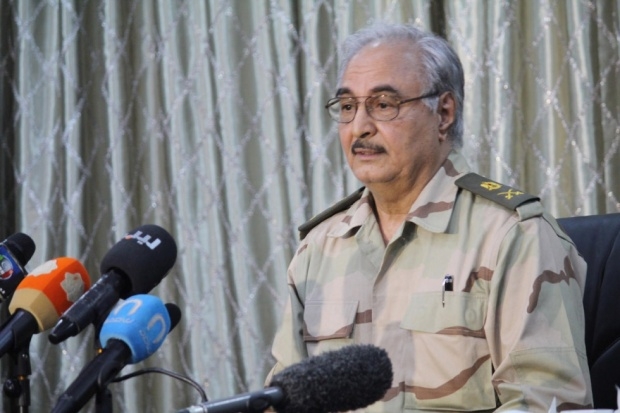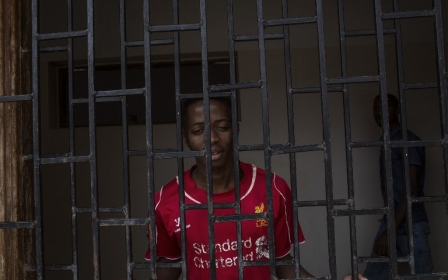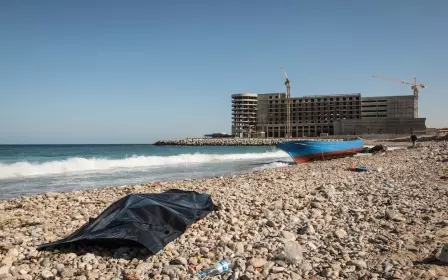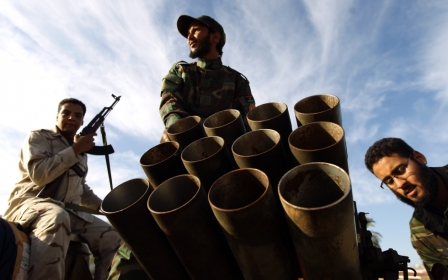Leaked recording reveals 'propaganda' against Tripoli's anti-Haftar forces

An officer under the command of the renegade Libyan general Khalifa Haftar was allegedly taped talking to a media tycoon about a propaganda campaign aimed at persuading Libyans that the Tripoli-backed fighters who retook some of the country’s key oil ports recently were al-Qaeda militants.
In the recording, broadcast by Tripoli-backed al-Nabaa TV on Wednesday, the officer, whose identity is unknown, allegedly tells the media tycoon Mahmoud al-Misrati to mount a campaign to smear Haftar's political opponents in Benghazi.
According to the aired recording, which Middle East Eye could not verify independently, the officer said that Haftar’s forces wanted to spread the message that al-Qaeda militants were involved in taking over the ports in the oil crescent, saying “al-Qaeda, al-Qaeda, al-Qaeda… they will become in the eyes of the people, al-Qaeda”.
“People have started saying that these are not al-Qaeda…we must plant the idea in people’s thoughts that they are al-Qaeda,” he continued.
After the conversation was aired, al-Misrati, who is a former adviser to the dialogue team of the House of Representatives in Tobruk, called the station saying that he wasn't concerned by the content of the phone call.
“Firstly, prove that it’s my voice. Secondly, there is nothing at all in the recording that would hurt me… all of the content in the recording, it is correct that I say it and I write it in my posts, and therefore I have nothing to hide,” He said. “Yes, I do steer public opinion. I manufacture public opinion and shape it, and we are the ones who guide people.”
The recordings reveal the intention to mount a propaganda campaign to associate what is known as the Benghazi Defence Brigades (BDB) with al-Qaeda, and to “discredit the revolutionaries”, according to Libya Prospect.
They also claim to reveal that the former ambassador to the UAE, Aref Nayed, who is described in the recordings as “doing great work” in the United States, is supported by Haftar.
Nayed addressed the Heritage Foundation in Washington earlier this week, claiming the oil ports that were taken from Haftar had been captured by al-Qaeda, a story supported by the officer and al-Misrati in the recording.
Mattia Toaldo, Policy Fellow at the European Council on Foreign Relations, said “the propaganda campaign” linking BDB with al-Qaeda is going ahead “full steam” with Nayed’s Heritage Foundation appearance.
“It is hard to see how an al-Qaeda-associated group could ever decide to hand over oil terminals to a UN-backed government,” Toaldo told MEE.
The recording said Hafter’s forces were in contact with Egyptian officials and had received a promise from Egypt that it would militarily support the renegade general’s efforts to reclaim the oil ports. The recording specifically mentions the targeting of Al Jufrah, a district in central Libya.
According to Wolfgang Pusztai, a security and policy analyst, if a serious offensive were launched against Al Jufrah, increased fighting from the Misrata militias may be provoked. This is “because, for them, Al Jufrah is decisive for their line of communication to the south where they control several oilfields,” he wrote.
The recording also csaid Haftar continues to use mercenaries.
Centres of power
Libya currently has three political centres of power.
The UN-backed Presidential Council (PC) based in Tripoli and headed by Fayaz al-Sarraj. The PC presides over the Government of National Accord (GNA), which has yet to be endorsed by the Tobruk-based House of Representatives (HoR).
The second is the rival Government of National Salvation, which controls what is left of the General National Congress that was elected in 2012. It is based in Tripoli and headed by Prime Minister Khalifa Ghwell. The Government of National Salvation does not control “relevant institutions” in the capital, according to the European Council on Foreign relations.
The third is made up of the various authorities based in the east of the country, namely the HoR and al-Bayda-based government of Abdullah al-Thinni. While the HoR was a part of the Libyan Political Agreement (LPA), which was backed by the UN, it has so far declined to support the Presidential Council. Last month, HoR President Aguila Saleh Issa told MEE that al-Sarraj's government is not legal, calling it a “sham”.
Meanwhile, Haftar’s forces operate in Benghazi. The renegade general has been at war with militants he describes as terrorists in the east of the country.
Not convincing
According to Izzedein Aqeel, a political scientist specialising in crisis management, the recording is not convincing.
Aqeel said he does not see Egypt as strongly supporting Haftar any longer. It seems as though Egypt has “left Haftar to his fate”, he said in an interview with Al Jazeera.
He said after Haftar “offended” the Egyptians by refusing to meet with al-Sarraj during his latest visit to Egypt.
However, a political analyst who wishes to remain anonymous, told MEE that the recordings confirm what is already known - Egypt has carried out air strikes in Libya in support of Haftar.
But he added that Egypt seemed to be moving away from its “one-sided” support for Haftar.
The analyst said the statement in the recording regarding Egyptian intervention, was “more of a wish than a promise”.
In the recording, the person alleged to be al-Misrati and the officer discuss links with the Islamic State (IS) group in Bani Walid in the northwest of the country, and warn that IS operatives there should remain covert and not show “those black flags”.
Toaldo warned that the leaks will “further fuel the feeling in the anti-Haftar camp that he is in cahoots with ISIS [another acronym for IS].”
The analyst called the alleged conversation a “sad reflection” of the Libyan conflict.
He highlighted the damaging nature of claims about Haftar’s use of mercenaries, and that the renegade general had allowed IS militants to leave the east and make it to Sirte and Bani Walid in the west.
Such accusations, he said, may hamper the Haftar-led military campaign Operation Dignity, which was launched in May 2014 to root out militants from Benghazi.
New MEE newsletter: Jerusalem Dispatch
Sign up to get the latest insights and analysis on Israel-Palestine, alongside Turkey Unpacked and other MEE newsletters
Middle East Eye delivers independent and unrivalled coverage and analysis of the Middle East, North Africa and beyond. To learn more about republishing this content and the associated fees, please fill out this form. More about MEE can be found here.




